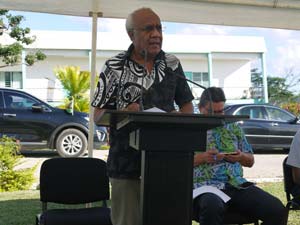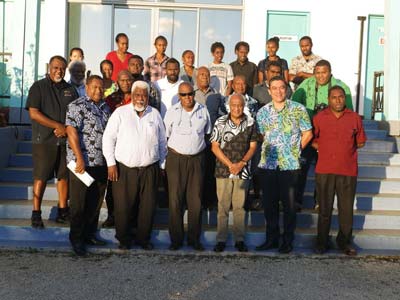
Jane Joshua
PORT VILA (Vanuatu Daily Post/ Radio New Zealand International/ Pacific Media Watch): Vanuatu's Prime Minister Sato Kilman has officially met with media practitioners at the office of the Prime Minister.
With the Deputy Prime Minister Moana Carcasses, other cabinet ministers, political advisers, legal practitioners, the Office of the Government Chief Information Officer (OGCIO) and media personnel in attendance, Kilman acknowledged those present to share and exchange views on important issues surrounding the media industry and how to address them.
The issues were discussed in order that the right to information is benefited from and that the use of information is advancing people’s lives and the development in Vanuatu.
“The right to freedom of expression is one that is enshrined in our Constitution, but it is important that we must know that this comes with a responsibility,” said Kilman.
“The rise of new technology and greater access to new media has brought about a possibility for anyone with access to a phone and the internet to make comments and claims, whether true or untrue that can reach a number of people in a very short time.
“Those using new media, as well as contributing to talkback show radio programmes, in my view, do not necessarily understand that the right to express an opinion comes with the responsibility not to defame or otherwise damage the reputation of others.”
This presents a challenge to the government and the traditional media; the newspaper, radio and television.
Diplomatic post
Kilman referred to a specific incident where a journalist reported on the Prime Minister's duties.
“Very recently, a very senior journalist printed that as the then Prime Minister, I appointed a certain gentleman to a diplomatic position in Beijing. The PM has no such power to do such unless he holds the portfolio of Foreign Affairs,” he said.
Radio New Zealand International reported that journalists at the meeting agreed they needed to take extra care, but say political leaders must also know how to use the media and to accept that when they do wrong, it will be reported.
Kilman said journalists and editors "who once controlled what was in the media now have to compete with everyone who has a phone, internet access and an opinion".
“Journalists generally have some training and will agree to abide by a code of ethics, also they will have an editor or other colleagues to provide a filter on what is printed or broadcast.
“It is much harder for a journalist to make a defamatory statement in the newspaper or radio than it is for an untrained person commenting on FaceBook.”
Regulating media
For the government, one challenge is to decide when and how to regulate in this new media environment.
Another is how to prevent the misrepresentation of the government’s functions and activities in these new public spaces and how to deal with misrepresentation when it occurs.
Kilman said one way that the government and media have been working together to meet these challenges is the development of the right to information (RTI) policy for Vanuatu.
The RTI policy provides the means for government agencies to make decisions on what information should be publicly available.
This policy, when fully implemented across government, will provide easy access to accurate and authoritative information for all. This is critical in the new media environment, the prime minister said.
The interaction also included feedback, comments and suggestions from media personnel including the president of the Pacific Islands News Association (PINA), Moses Stevens, as well as veteran journalist Jonas Cullwick who spoke on behalf of the president of Media Asosiesen blong Vanuatu.
This work is licensed under a Creative Commons Attribution-NonCommercial 3.0 New Zealand Licence.




